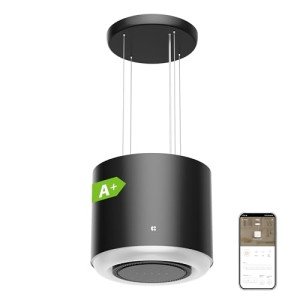Responsible For An Island Cooker Hood Extractor Fan Budget? 10 Ways To…
페이지 정보

본문
Island Cooker Hood Extractor Fan: The Essential Guide
In contemporary kitchen design, the island cooker hood extractor fan has become a vital appliance, marrying functionality with visual appeals. As cooking areas significantly transform into multifunctional spaces where cooking, dining, and socializing occur, the importance of an effective ventilation system can not be overlooked. This article aims to explore the benefits, types, setup factors to consider, and upkeep practices related to island cooker hood extractor fan for island hob fans.

What is an Island Cooker Hood Extractor Fan?
An designer Island Range hood cooker hood extractor fan is a ventilation appliance suspended from the ceiling above a kitchen island or counter top. Its primary function is to extract airborne grease, smoke, steam, and smells developed throughout cooking. Unlike wall-mounted hoods, island hoods provide unblocked views and preserve a sleek design, necessary for open-plan living spaces.

Advantages of Installing an Island Cooker Hood Extractor Fan
- Improved Air Quality: Removes impurities from the air, promoting a much healthier cooking environment.
- Visual Appeal: Available in different styles, they act as a focal point in modern cooking areas.
- Sound Reduction: Many designs provide peaceful operation, enabling comfy kitchen discussions.
- Improved Lighting: Some hoods include integrated lighting to light up the cooking surface more effectively.
Kinds Of Island Cooker Hood Extractor Fans
Island cooker hood extractor fans can be classified based upon their functionality and design. Here's a breakdown of the numerous types:
| Type | Description |
|---|---|
| Ducted Hoods | Ventilate air outside through ductwork; perfect for heavy cooking jobs. |
| Ductless Hoods | Usage filters to purify air and recirculate it back into the kitchen; easier to install and keep. |
| Convertible Hoods | Can be converted from ducted to ductless; deals flexibility based on kitchen setup. |
| Wall-Mounted Hoods | Set up versus the wall but can be used above an island if set up properly. |
Elements to Consider Before Installation
When considering an island cooker hood extractor fan, there are numerous aspects to bear in mind:
Size and Height: The hood should be proportional to the cooking surface. A general rule is to have the hood 30-36 inches above the cooking surface.
CFM Rating: Consider the CFM (Cubic Feet per Minute) score, which suggests the airflow capability. Higher CFM is ideal for heavy cooking.
Sound Level: Look for model requirements concerning noise levels, measured in sones. Go for a score of 1.5-3 sones for quiet operation.
Design: Aesthetic appeal is essential. Pick a hood that matches the kitchen's overall style, including materials and finishes.
Lighting and Features: Consider models with integrated LED lights and additional functions like variable fan speeds.
Setup Process
Installing an island cooker hood extractor fan kitchen island fan normally requires professional assistance due to the intricacies included. Nevertheless, here's a quick summary of the setup actions:
Preparation: Select the appropriate location above the kitchen island cooker hood island and ensure there's adequate area for ducting if required.
Installing: Secure the mounting bracket to the ceiling, ensuring it is level and anchored into a joist for correct support.
Ducting (if suitable): Run ductwork from the hood to the outside of the home, guaranteeing it is insulated to minimize heat loss if you're utilizing a ducted alternative.
Electrical Connections: Connect the electrical circuitry based on the maker's guidelines, guaranteeing compliance with all local electrical codes.
Evaluating: Once set up, verify the fan operates properly and test the lighting functions.
Upkeep Tips for Island Cooker Hoods
To lengthen the life and efficiency of an island cooker hood extractor fan, routine upkeep is essential. Here are some helpful pointers:
Regular Cleaning: Clean the exterior and filters at least when a month to prevent grease accumulation.
Filter Replacement: If using a ductless hood, replace carbon filters every 3-6 months for ideal performance.
Check Ducts: For ducted models, guarantee that ducts are tidy and without obstructions to preserve effective airflow.
Inspect Lights: Regularly check and change burnt-out bulbs to ensure sufficient lighting throughout cooking.
FAQs About Island Cooker Hood Extractor Fans
Q1: Do I require an authorization to set up an island cooker hood?A1: It depends upon local structure codes. It's best to talk to regional authorities or a professional installer. Q2: Can I install an island
cooker hood myself?A2: While some useful homeowners may try
it, employing an expert is recommended due to the complexities associated with ducting and electrical work. Q3: How do I select the ideal CFM for my needs?A3: A general guideline is
to have 300 CFM for each 10,000 BTUs of the range. For
heavy cooking, think about a greater CFM score. Q4: How typically must I clean my island cooker hood?A4: The outside and filters must be cleaned
monthly, while carbon filters in ductless models must be replaced every 3-6 months. Q5: Are there energy-efficient designs available?A5: Yes, lots of producers provide energy-efficient choices that can assist conserve on electrical energy costs. An island cooker hood extractor fan is an essential addition to any contemporary kitchen, stabilizing aesthetic appeal with useful functionality. By understanding the types offered, considering essential installation aspects, and embracing regular upkeep practices, homeowners can guarantee their kitchen remains a fresh and designer island range hood inviting space. Whether going with ducted or ductless choices, investing in a quality island hood ensures a cleaner, much healthier cooking environment.
- 이전글Can Symptoms Of ADHD In Adults Always Rule The World? 25.05.21
- 다음글The Top Reasons Why People Succeed At The Renault Key Card Industry 25.05.21
댓글목록
등록된 댓글이 없습니다.
